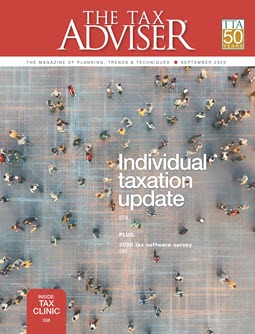- column
- From the Tax Adviser
State conformity to CARES Act relief
Please note: This item is from our archives and was published in 2020. It is provided for historical reference. The content may be out of date and links may no longer function.
Related
IRS will stay fully staffed for first five 5 days of shutdown
New law, IRS workforce cuts raise red flags for tax season, reports say
SECURE 2.0 amendment deadline extended for IRAs, other retirement plans

Most states rely in some form on the Code for administrative ease, but they do not automatically conform to all its provisions and, therefore, may or may not conform to each Code-related provision of the Coronavirus Aid, Relief, and Economic Security (CARES) Act, P.L. 116-136. In general, states conform to the Code in one of three ways: (1) rolling or automatic conformity; (2) static conformity — conformity as of a specific date; or (3) selective conformity — conformity to only certain sections or definitions. To ultimately determine state conformity to Code provisions, taxpayers must know each state’s Code conformity method, legislative or other administrative modifications to specific Code sections, and the application of conformity methods and modifications to different types of taxpayers (i.e., business entities vs. individuals). This creates a tremendous amount of complexity, further muddied by years of inconsistent federal and state treatment.
In addition, and very importantly, several CARES Act provisions — like the Paycheck Protection Program and its loan forgiveness provisions — are not in fact tied to the Code, so states’ rolling, static, and selective general conformity regimes are not squarely applicable. Not surprisingly, therefore, whether a state will conform to any of the CARES Act economic relief provisions depends on each state’s existing tax code and overarching federal conformity regimes, as well as targeted legislative and administrative guidance.
Relative to the CARES Act’s tax provisions, state conformity to date is varied — in part because of limited explicit guidance. As an example, Illinois generally conforms to the Code on a rolling basis, and therefore it adopts most Code provisions, unless otherwise modified. Given the current absence of specific legislative action and administrative guidance as to the adoption of specific CARES Act tax provisions, Illinois will generally conform to the tax provisions of the CARES Act. However, like many other states, Illinois will not conform to the CARES Act’s business net operating loss (NOL) provisions. Instead, Illinois will retain its treatment of business NOLs, not allowing any carryback and allowing only a 12-year carryforward.
While New York also historically conforms to the Code on a rolling basis, its 2020—2021 Budget Act, enacted on April 3, 2020, creates static Code conformity temporarily, indicating that for tax years beginning before Jan. 22, 2022, any amendments to the Code after March 1, 2020, will not apply. Accordingly, New York will decouple from the CARES Act’s NOL provisions, business interest expense limitation relief, and qualified improvement property depreciation changes. Ohio declared it is in full conformity with federal income tax law as it existed on March 27, 2020, including the CARES Act and its applicability to Ohio’s income taxes. Notably, determining conformity to these three main CARES Act tax provisions in many states is further complicated by pre-COVID-19 conformity — or lack thereof — to the law known as the Tax Cuts and Jobs Act, P.L. 115-97.
Administratively, with respect to the carryback of NOLs, if a state does allow for the carryback of losses in conformity with the CARES Act, taxpayers will likely need to file amended state returns to obtain this benefit. In the absence of specific CARES Act—related state guidance, existing relevant state amended return and income tax refund claim rules (for example, rules regarding timing and limitations) govern. Thus, rules may not line up with federal rules due to years of disparate treatment in this area. Also relative to NOLs, while some in the market may push for the option to cash out NOLs as a source of liquidity for taxpayers amid the ongoing economic stress caused by the pandemic, states may not be so quick to oblige.
For a detailed discussion of the issues in this area, see “State & Local Taxes: Diagnosing the SALT Effects of COVID-19: Part 1,” in the September 2020 issue of The Tax Adviser.
— Carolyn Puzella, J.D., LL.M.
The Tax Adviser is the AICPA’s monthly journal of tax planning, trends, and techniques.
Also in the September issue:
- An update on tax developments affecting individuals.
- A look at tax practice issues during the COVID-19 pandemic.
- A discussion of developing an approach to advising clients on Roth IRAs.
AICPA members can subscribe to The Tax Adviser for a discounted price of $85 per year. Tax Section membership includes a one-year subscription to The Tax Adviser.




















